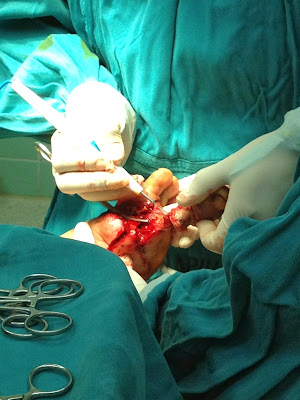Hey strangers,
This post is a bit overdue but after returning from Chone, Quito was pretty slow and I kind of forgot/procrastinated on writing my weekly posts.
The week we got back, Maddie, George, and I were placed on the same rotation in surgery. The program asked what we were interested in seeing after Chone and we all said various specialties of surgery, but none of these were available so the next best thing was general.This was the exact same rotation I had week 2 with Dr. Vargas... the really intimidating surgeon. This time he seemed to be in a bit of a better mood and he actually was quite helpful, trying to get us into as many surgeries as we could watch. Again, I saw several gallbladder removals and hernia operations. One unique case we saw was a twisted colon, but we spent most of the surgery watching through a window because there were too many med students in the operating room. A little disappointing.
Also during week, George and I finished up our last few hours of Spanish class with a new professor, Luis. He had just returned from Spain where he was finishing his master's degree in screenwriting. He was a really cool guy. We spent whole day talking about the education and political system in Ecuador and it was completely fascinating. The opportunities possible in their education system seem almost too good to be true.
My whole last week here was dominated by parties and festivities in Quito. The capitol's independence is December 7th so the whole city was focused around celebrating day and night. I only had two days of clinic this week at a family/woman's clinic in a neighborhood way outside of Quito. It was about an hour and a half bus ride each way. We didn't really see anything new at this clinic. There were a lot of sick kids and women complaining of stomach pain. One woman had a breast engorgement. This is a hardening of the breast milk. I had never heard of this before and I can't imagine how painful it must be. The woman was doing everything she could not to scream when the doctor and I were feeling the mass.
Our group joined the parties this week by going out to Ladies Night in the new part of Quito and to La Ronda in Old town. At La Ronda we met up with some friends and ended up getting invited to a semi-random neighborhood tent party. We were the ONLY white people and probably the only people that didn't live in the neighborhood. Our friends kept buying us crates of beer and soon we were doing conga lines and forming dance circles in the middle of the dance floor. Super weird, but really fun!
I'm glad my time in Quito ended with this week of celebration, it was fun to see the whole town come out and party together. I was sad for my program to come to an end, I have learned more than I can express and this trip has only made me more excited to start a career in health care. Everything I have seen has only fueled my curiosity and made me hungry to go more places, challenge myself out of my comfort zone and learn new things. I am so blessed to have had this opportunity and am so grateful for all the doctors, nurses and random friendly Ecuadorians who made me feel so welcomed here!
All that being said, I can't wait to get home and celebrate Christmas with my family and friends.
Also, IMPORTANT MESSAGE FOR MOTHER: Words cannot express how excited I am to eat your chocolate chip cookies again. I have only been waiting 2 1/2 months for those!

































.jpeg)
.jpeg)
.jpeg)

